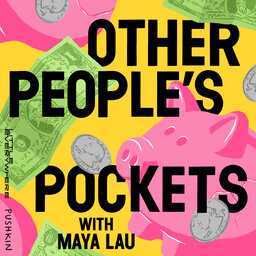Laura Lyster-Mensh, Death Doula
In witnessing people go through the dying process, Laura Lyster-Mensh has discovered some surprising things: family-related financial shenanigans, aloneness, and secrets come to light. She's also realized that unlike being a birth doula or a hospice nurse, being a death doula is not a way to earn money. Why? Listen to find out.
Follow Laura Lyster-Mensh:
Twitter: @lauracollinslm
Instagram: @lauraoncapitolhill
Follow Maya Lau at:
Twitter: @mayalau
Instagram: @itsmayamoney
TikTok: @itsmayamoney
 Other People's Pockets
Other People's Pockets


